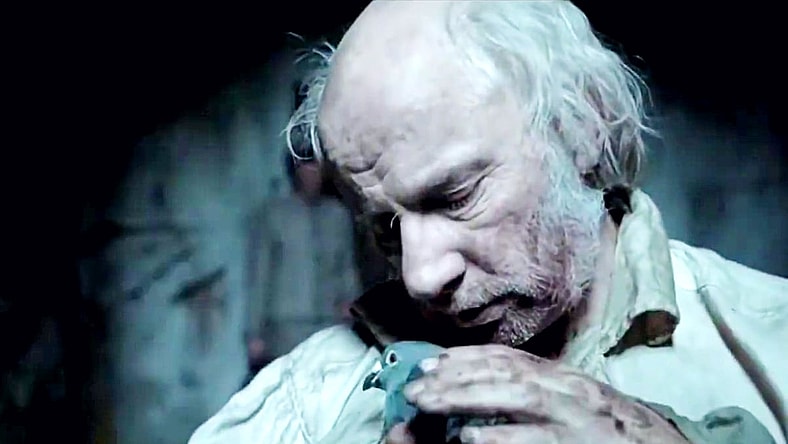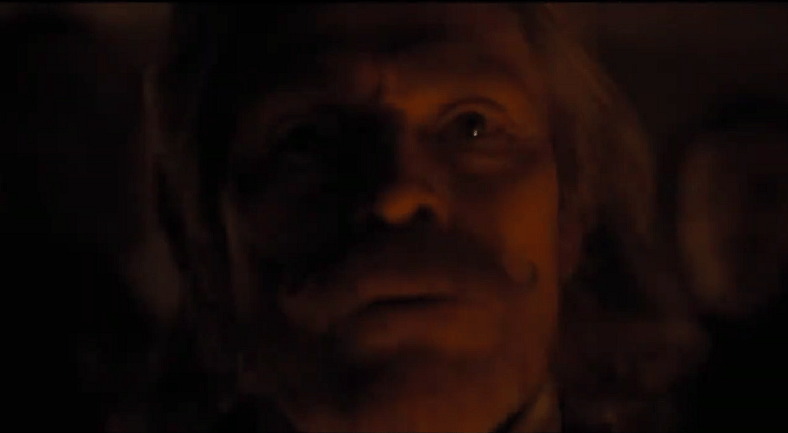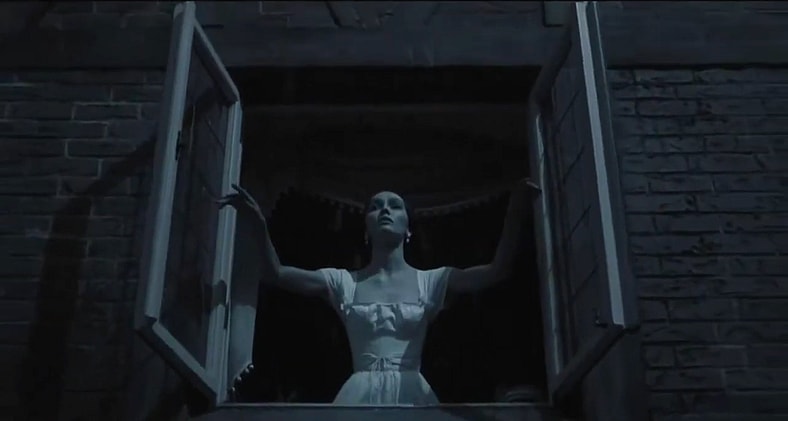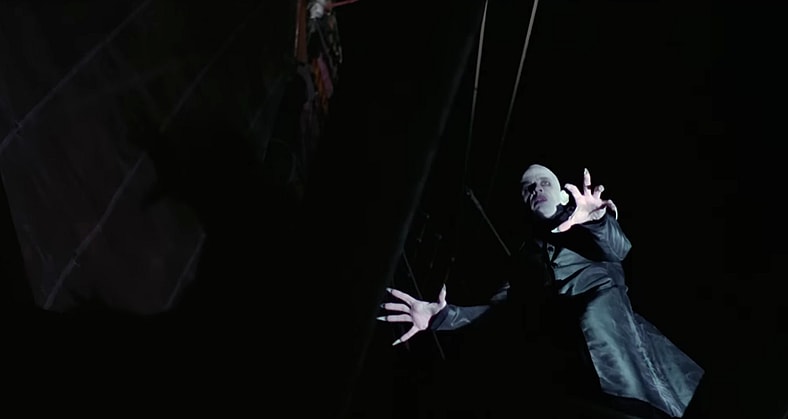‘Nosferatu’ Review: Excellent Cinematography And Set Design Isn’t Enough To Sustain The Ponderous, Facile Re-Remake

‘Nosferatu.’ Does this word not sound like the midnight call of the Bird of Death? Do not utter it, or the images of life will fade into pale shadows, and ghostly dreams will rise from your heart, and feed your blood.

RELATED: ‘Werewolves’ Review: ‘Dog Soldiers’ Meets ‘The Purge,’ Complete With The Guy From That Series
Beware that his shadow doth not burden your dreams with horrible fears. Beware the Nosferatu, the unclean, and beware the plague that follows in his deathly wake. For he has risen once more…
…And he has seen better nights.
Walking out of the Music Box Theater, I could hear people already starting to gaslight themselves over the movie we all just watched together. Their voices echoed across the ceiling of the theater lobby, continuing along the walls while we did our mass Exodus through the front entrance, and briefly following me down the sidewalk before eventually vanishing into the nighttime sky.

Voices rife with confusion, and fragile uncertainty were trying to process (and already trying to justify) the direction Robert Eggers (The VVitch, The Lighthouse, The Northman) steered his re-remake of the 1922 silent horror masterpiece, Nosferatu.
Words such as “bold” and “interesting” were used to describe it. While those terms of ambiguity are not incorrect, they don’t always translate to “good”, or even “so-so” for that matter. If there’s one word that truly encompasses the 132 minutes spent watching that movie, I would pick “underwhelming” without hesitation, and (without further delay) here are the reasons why.

It opens with the introduction of Ellen (Lily-Rose Depp). This young woman possesses burgeoning precognitive abilities (or The Shining, if we’re being honest), and she prays for companionship in her otherwise lonely life in 1830s Wisborg, Germany. One night, her prayers are answered when a strong presence visits Ellen during one of her visions.
The malevolent voice claims that she has awakened him from the darkness and she must pledge a psychic oath to be his. Somehow seduced by this sinister-sounding specter, Ellen seals the compact with her consent. Immediately, she has a vision of being attacked by the hideous owner of that voice and goes into violent convulsions in the front yard of her home. Cue the title sequence with shrieking violins that I personally saw coming from across oceans of time.
Years pass, and Ellen is married to a real estate agent, Thomas Hutter (Nicholas Hoult). A devout husband who stands behind his seemingly unstable wife, and accepts her morbid quirks, he also has the spine of a jellyfish. However, the young fellow is not without ambition because he accepts an offer from his employer, Herr Knock (Simon McBurney), that takes him to the isolated mountain region of Transylvania, and the castle of Count Orlok (Bill Skarsgård).

Skipping all forms of exposition, Hutter reaches a village on the outskirts of Orlok’s domain, freaks out the peasants by confiding his destination, gets shunned from the town (after witnessing a rather macabre nightly ritual), and walks to the Borgo Pass in a mere handful of minutes.
He finally gets to the decrepit castle at midnight and is greeted by the Count who manages to hypnotize him into signing divorce papers (legal?), and feasts on his blood before Hutter’s clothes even have the chance to warm up by the roaring fire. To say this film has bad pacing would be the understatement of many centuries.
The rest of the film’s plot somewhat adheres to that of the original, but with a few slight alterations, and none of them are an improvement. Hutter makes an unceremonious escape from the castle, and Orlok sets off to Wisborg for Ellen. Apparently, she has to renew her seizure pledge from years ago, and he’s going there to personally make damned sure that she does it.

What follows next is a 2nd and 3rd act that overflows with cardboard acting, badly-timed humor, blurry background characters, and dragged-out scenes that give way to ones that gloss over important points of the story. These include moments of Orlok randomly possessing Ellen, and it’s like watching someone who decided to mix coffee with a handful of Adderall.
Willem Dafoe delivers over-the-top zeal as a scientist turned occultist, Professor Albin Eberhart Von Franz. The acting legend seemed to be channeling the same energy as Sir Anthony Hopkins, and his scenery-chewing portrayal of Abraham Van Helsing in Bram Stoker’s Dracula from 1992. The similarities with that equally over-stylized nothing burger of a movie don’t end there either.
Depp’s atrocious English accent reaches Keanu Reeves levels of cringe throughout her performance. The movie swerves away from the Dracula story enough to where the Stoker estate doesn’t have much ground for a copyright infringement lawsuit this time around, but Francis Ford Coppola may have a shot. Speaking of English accents, it’s hard to ignore the fact that almost everyone in the film seems to have one of those.

For a director who really packs a wooden stake for historical accuracy in his work, it will be interesting to hear Eggers try to explain why he chose to make Nineteenth Century Germans sound like what one expects to hear while wading through the foggy streets of Victorian London.
To his credit, most of their dialogue is at least within walking distance of discernible, but the same can’t be said about the man of the hour. The worst has been saved for last, my fellow children of the night. Some may see this as a spoiler alert, but believe me when I say that it’s actually a warning to any fans of the original film, and/or the brooding 1979 remake.
Aside from the references to those two superior films that come off as completely forced, and ring hollow to those who’ve spent a lifetime enjoying the aforementioned classics, Count Orlok has been given a new look that greatly deviates from Max Schreck’s original portrayal and even Klaus Kinski’s interpretation.

Hardly a word can be understood through his Eastern European accent that’s thicker than the bushy mustache hanging off of his decayed face. That’s right, I said “mustache,” people! A big, black, (17)70s style pornstache that looks like someone crossbred Doctor Robotnik with Grendel from the Beowulf poem.
Count Pornstache spends the majority of the time incessantly droning on in this jarring, monotonous tone while his appearance remains hidden beneath the lowest of low-key lighting that ends up making him look more like Krampus, but only if the holiday demon was two hundred years into a deep addiction to regular 1800s over-the-counter opioids.
Replacing his signature two front incisors are a mouthful of pointy teeth that are capable of doing serious bodily damage, but their impact doesn’t even break the skin. There’s also a scene where Orlok stands up inside of his coffin, naked, and the audience gets an eyeful of his “member of the undead,” which is completely unnecessary. Luckily, it was just a prosthetic flashing, and nothing more.

As mentioned in the headline, the cinematography and set design for Nosferatu is top-notch, and it wouldn’t be a surprise if the movie won some awards for it. However, it completely lacks the surreal German Expressionism that makes F.W. Murnau’s original so special, and the genuinely grim atmosphere that breathed brilliantly bleak life into Werner Herzog’s Nosferatu The Vampyre.
This new incarnation is a different type of strigoi that hasn’t been seen throughout the last one hundred years of its existence in cinema. It could’ve potentially been an interesting movie on its own, but instead, it fell short while feeding off the essence of another – an irony that is both sad and darkly poetic.
Nosferatu is now playing in theaters. Check out the trailer below:
READ NEXT: Bounding Into Halloween Night 21: Silence Is Golden With ‘Nosferatu’ & ‘The Cabinet Of Dr. Caligari’
Nosferatu (2024)
PROS
- Great Cinematography
- Authentic Set Design
- Beautiful Costume Design
CONS
- Terrible Pacing
- Dreadful Editing
- Overstuffed Story
- Needlessly Long Runtime
- Shallow Performances
- Swiss Cheese Plot
- Bushy Vampire Mustaches
- Orlok's Look, Dong, and Accent
- Willem Dafoe Channeling Anthony Hopkins From Bram Stoker's Dracula
- Lily-Rose Depp Channeling Keanu Reeves From Bram Stoker's Dracula
- Nicholas Hoult Channeling Butters From South Park
- Predominantly English Accents in 1838 Germany
